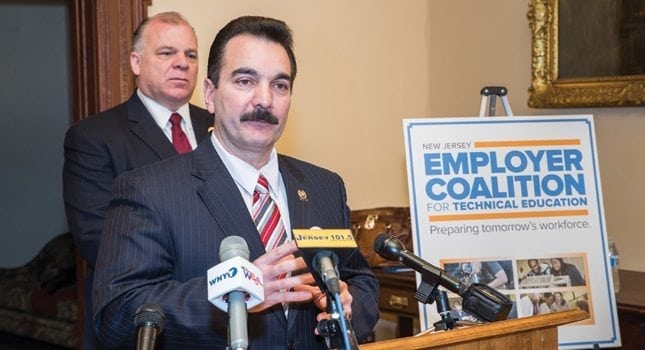
Employer Coalition for Technical Education
Partnership Formed to Help Eliminate Workforce Skills Gaps.
By Anthony Birritteri, Editor-in-Chief On Apr 4, 2014Employer and education leaders, along with Senate President Stephen Sweeney and Assembly Speaker Vincent Prieto, met recently at the Trenton State House to announce a new partnership created to support career and technical education opportunities that address workforce needs and prepare students to fill jobs that are in demand.
Spearheaded by the New Jersey Business & Industry Association (NJBIA), the NJ Employer Coalition for Technical Education will “address the growing problem in the state and across the nation; the gap between the skills employers need and the skills available workers have,” said Melanie Willoughby, NJBIA acting president. “Career and technical schools teach these needed skills. That is why this coalition is committed to promoting their benefits to all: parents, students, teachers, legislators and businesses.”
Judy Savage, executive director of the New Jersey Council of County Vocational-Technical Schools, commented that businesses have always had relationships with vo-tech schools via: serving on vo-tech advisory boards, offering internship opportunities and workplace learning experiences to students, hiring students and donating equipment, for example. “However, the purpose of this coalition is to reinvigorate and extend these efforts. We want to get more employers, especially the larger employers, engaged and inform us on what their employment needs will be, say, 10 years from now,” she said.
Senate President Sweeney said the skills gap identified by US employers is “severe” because the nation has taken a position in which it is moving away from vocational training. “If we don’t start training people to be electricians, carpenters, plumbers and ironworkers, who is going to do the work?” he asked.
“We must expand opportunities for those students who do not plan to attend a four-year college or university,” said Assembly Speaker Prieto. “And for many individuals, a vocational career is a different pathway [to college].
“One study shows that 27 percent of people who go into the trades or have a certificate make more money than people with Bachelor’s degrees. Additionally, a Georgetown University poll revealed that 65 percent of the workforce by 2020 is going to need more than a high school diploma, but not a four year college education. So this coalition is the right path,” Prieto continued. “We thank the county vocational schools for partnering with the business community and NJBIA. We will work together with you, however we can, with helpful legislation.”
While employers cannot find workers with the right skills, vocational schools in the state currently do not have the capacity to take all applicants. According to the NJ Council for Vocational-Technical Schools, approximately 28,160 people applied to vo-tech schools, but only 11,447 enrolled in 2013. “Our schools have grown, but they are turning away thousands of students. So, there is a need to expand capacity while getting students and parents to think of [vo-techs] as potential educational choices,” Savage said.
Among the coalition’s recommendations: State policy should support multiple pathways to success, rather than a one-size-fits-all college preparatory mindset; and the state should also support joint ventures between county vo-techs and community colleges that address employer needs in key industry sectors and create career pathway opportunities for out-of-school youth and adults.
The coalition already has more than 130 members representing small businesses, large companies, labor unions, trade associations, educational institutions and individuals throughout the state.
Related Articles:





